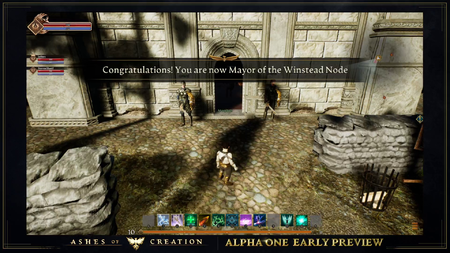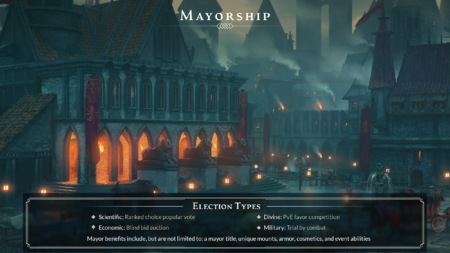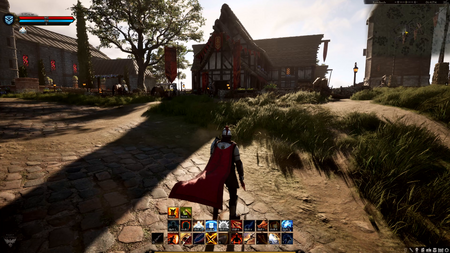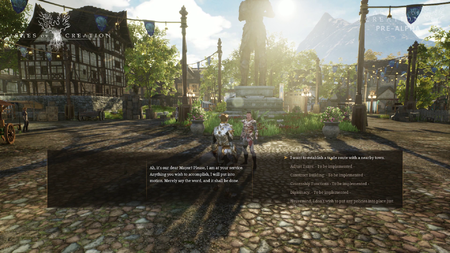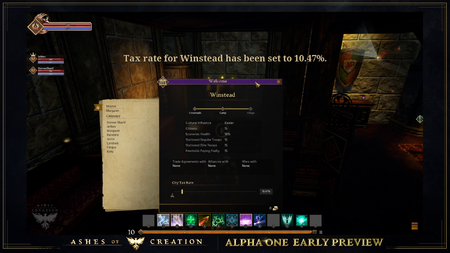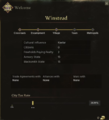Node-Regierungen
Node-Regierungen werden aus den Bürgern einer Node gewählt, sobald diese Node die Dorf-Stufe (Stufe 3 ) erreicht. [2]
Positionen innerhalb der Regierung einer Node werden durch Titel erlangt, wodurch der Träger Zugang zu besonderen NPCs in der Node erhält.[3]
- Bürgermeister.[4]
- Priester, Bischöfe oder Akolythen in bestimmten Tempeln.[5][3]
- Patron Gildenleiter leader.[3]
- Oberster Kopfgeldjäger.[3]
Es gibt viele Dinge, die ihr innerhalb [einer Node] anstreben könnt, die euch diese besondere Behandlung gewähren.[3] – Steven Sharif
Node elections
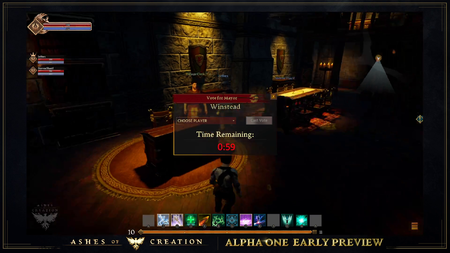
The village stage is a unique stage because that's when the government system comes online and all other stages past village there will have already been a cadence for the election system and it will follow that cadence, but after the initial village stage is completed there will be a one week period where players have an opportunity to establish citizenship at the village that also provides for the cooldown time that is- that would be present on players leaving another node to participate in in this particular node leveling up. But that after that one week period then there will be a one-week election process and then from that point moving forward will be the one month cadence that the node experiences elections on.[7] – Steven Sharif
Once a node has reached Dorf (Stufe 3) there will be a one week cooldown period before node elections begin.[7]
- This cooldown period allows players to establish citizenship at the village; which may require them to relinquish previous citizenship at another node.[7]
- Following the initial cooldown, there will be a one week election process, then from that point on, elections will follow a monthly cadence.[7]
- Node-Belagerungen may not be declared for 21 days following a node advancing to any stage.[8]
Node elections occur on a monthly basis.[7][10]
- Election notices will be mailed to the accounts of citizens.[11]
- Only citizens of a node may participate in its elections.[2]
- Only node citizens may be elected mayor.[12]
- A king or queen can also become a mayor.[12]
Node election types
Bürgermeister are chosen through different methods according to the node's type.[16][17]
- Divine node mayors are elected based on the citizen who earns the most PvE favor with the node.[14][15][18][16]
- Most of the devotion-oriented tasks are going to be on an individual basis and won't utilize outside support.[19]
- Economic node mayors are elected via a blind-bid auction where the citizen bidding the most money wins.[14][15][18][16] This is a gold sink.[20]
- Bürgermeister von militärischen Nodes werden aus Bürgern der Node durch einen gladiatorähnlichen Arenakampf (Last-Man-Standing) ermittelt.[18][22][23]
- Eine Idee, welche derzeit in Erwägung gezogen wird, besteht darin, dass Spieler einen Champion ausbilden können, mit dem sie anstelle ihrer eigentlichen Charaktere in der Arena antreten werden. Diese Champions können mit Ausrüstung und Fähigkeiten via Aufträge versehen werden, sowie mit Materialien und Gold verstärkt.[24]
- Der Grund für die Champion-Idee ist die Imbalance des 1v1 PvPs im Spiel. Durch den Einsatz von Champions wird der Arenakampf ausgeglichener.[24]
- Arenakampf ist instanziert, aber das Zuschauen könnte über ein Interface implementiert werden.[25]
- Der Gewinner eines Kampfes kann das Bürgermeisteramt nicht auf einen anderen Spieler übertragen.[26]
- Wissenschaftliche Noderegierungen werden demokratisch gewählt. [18][16] Aufzeichnungen darüber, wer für wen gestimmt hat, werden nicht veröffentlicht. [11]
Rathaus
Town hall (also called City hall) is a default service building that comes pre-built with nodes.[29][14][30][28]
- Players can interact with the node board to get a list of its citizens.[11] Clicking on a citizen will reveal information about their guild, society, religion, and property ownership.[11]
- Bürgermeister and node governments use city hall to visualize and control activities within their node. These capabilities will also be available via mobile/web interface.[4]
- Status of the node's economy.[4]
- Status of upcoming elections.[4]
- Status of trade agreements.[4]
- Status of caravans.[4]
Bürgermeister
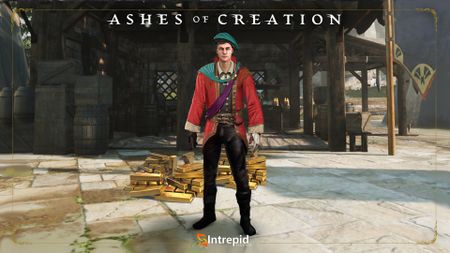
Mayors have a unique ability to elicit change within the node proper, either through the destruction of certain buildings that have been constructed previously, because there's a limited number of slots that buildings can be constructed within, or the kickoff of additional projects, or the certain types of policies that can be enacted, like... the changing of a tax rate. They all have a unified source of energy requirement and the energy requirement is a mandate.[32] – Steven Sharif
Bürgermeister are chosen through different election methods according to the node's type.[16][17]
- Only node citizens may be elected mayor.[12]
- Previous mayors won't have any special system driven bonuses to help them get reelected.[33]
- Könige und Königinnen can also become a mayors.[12]
- Mayoral leadership powers are granted via the use of mandates.[32][4]
- Players will be able to view a historical listing of mayors of a node.[34]
Mayoral caravans
Mayoral caravans (also referred to as Trade caravans) are launched by Bürgermeister to obtain needed resources from other nodes.[36][37][35]
- Nodes answering these resource requests must have a trade agreement or alliance with the requesting node.[37][35][28]
- Once the requesting mayor accepts a fill order from another node, a system driven caravan is spawned to transit the goods.[37][35]
- Players can participate in helping to defend the caravan if they wish.[37]
- Trade caravans can initiate world events.[36]
- Mayors who need certain resources that either they don't have enough of, or that they're prospectively investing in: they will initiate a mayor request, and any node that sees that request on the mayoral caravan drop-down menu will have an opportunity to attempt to fulfill the trade request. In order to fulfill a trade request, a node must have a certain level of relationship with that requesting node. At a minimum it has to be a trade agreement relationship; and then there's a limited number of those trade relationships that you can have; and that scales up to eventually alliance perspective. And then, once the node requesting mayor accepts a potential fill order, then a system spawned caravan is generated and the transit is completed. Players can participate in helping to defend that or not.[37] – Steven Sharif
Führungsbefugnisse
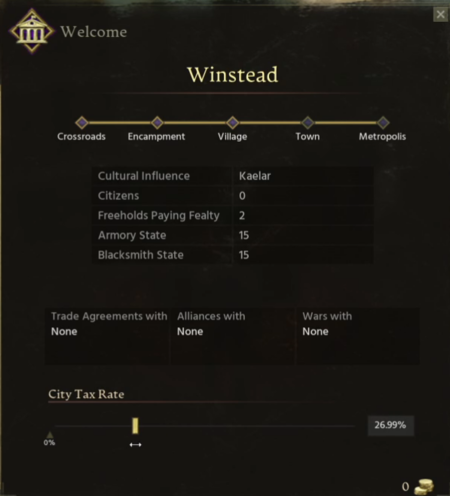
The government has a lot of say in the direction of the node's development. Directing assets, building projects, tax allocation, defensive ability etc. Players have the ability to not only create these cities, but they have the right of self-governance.[2]
Mayoral leadership powers are granted to mayors via the use of mandates.[32][4]
- Initiate buy orders using gold from the node treasury.[14][39][40][41]
- Initiate mayoral commissions to aid node development.[14][42][40][32][43][2]
- Adjust node taxes.[14][32][44] This includes setting tax rates that apply to tavern games.[45][46]
- Tax money may only be used to fund node development.[47]
- Initiate service building construction and expansions.[14][32]
- Improving node defensive structures, such as stronger walls and gates, traps, and siege equipment.[43][48][49][50][2]
- Hiring mercenary NPCs to defend the node during sieges.[51][2]
- Set a message-of-the-day for the node.[52]
- Proposing node policies that are voted on by citizens.[53][54][43]
- Mayors won't have formal systems to carry out surveys/polls of node citizens, but they will be able to utilize node citizen chat or message-of-the-day services.[52]
- Mayors may have special color names in node chat channels.[52]
- Entering into trade agreements with other nodes.[14][53][28]
- Mayors cannot denote players as enemies of the state.[56] Previously this was a potential option.[28][57]
- Mayors are notified when their node is named on a siege declaration scroll.[58]
- Mayors and lords of castles have spells they can use on the battlefield with high effect and long cooldowns for their teams.[59]
- Mayors gain new powers and responsibilities as their node advances.[17]
- Some leadership powers are specific to node type, biome, or dominant race, others are universal.[61]
- There definitely are differences... Some of the things that mayors can do are more universal, but then some systems have very specific if your node has a certain dominant race, or your node is a certain type, or it's in a certain biome. So there's even differences between where it is too.[61] – Chris Justo
- If a mayor does not make certain decisions within a set period of time then the system will make a decision for them.[63][64]
- Q: The idea behind all these nodes are awesome, but I wonder how it will actually play out in the live version. The problem is having player run or the problem with having player run towns is that people come and go in video games. So, will towns die out etc?
- A: We incorporate as part of those designs certain fail-safes, certain protections, certain automated progression that takes over when some of those decisions are lacking or are not made; and those decisions can be defaulted. Now, of course, that would have a deleterious effect on the direction that a particular node might want to go, because they're going to be doing default behaviors, or default actions, as opposed to something that might be in line with the strategic objective of that particular node, or the specialization that the node has previously been attempting to do. But that is why we have a regularly recurring election period where players can take the reins of power and can elect someone else to come in and participate and and re-right the ship, so to speak. So it is absolutely a component of having player-driven mechanics that there is an opportunity for things to be less than ideal, or less than strategic when certain bad-faith actors or people leave, but there are safeguards in place.[63] – Steven Sharif
Node policies
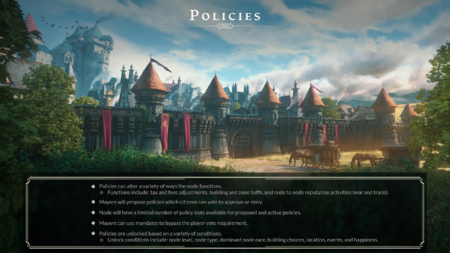
Nodes have a number of slots that they get to employ as Government policies that are enacted and chosen by the mayor and voted on by the people; and certain policies get unlocked by certain happiness states of the factions within the node; and those happiness states are predicated across different achievements that can happen in the world story arcs that get finished; bosses that get killed around you; new buildings that get constructed: Lots of different things can contribute to that happiness value: Number of citizens; number of citizens you've had leave; number of houses that might have been foreclosed upon. There's lots of different things that influence it, but when the happiness is met at a certain point- and even without that happiness you can still have policies that you get to enact regardless. You may choose policies that do certain things for the node; and this is a big strategic decision that the node has to almost agree on because it's voted on by the citizens within a short time period, but elected by the outstanding mayor; and when you deploy a policy it confers benefits to the citizens, or to the area, or to specific buildings, or to the mayor.[54] – Steven Sharif
Node policies affect a variety of node functions, such as taxes and fees, building and zone buffs, and node-to-node reputation activities, such as trade agreements, and node wars.[14][53]
- Bürgermeister propose node policies that are voted on by citizens within a 24-hour or shorter time period.[14][53][54][43]
- Policies are voted in if the majority of voters approve of them.[69]
- Mayors can utilize their available mandates to bypass policy votes.[14][53][32]
- Mayors may also be able to take emergency actions depending on certain predicates that get met. This might allow them to reduce the voting threshold or voting time for policies.[69][54]
- There are a limited number of policy slots available to be proposed.[14][53] Some policies occupy multiple slots.[54]
- Node policies that are deployed will provide benefits to various aspects of the node, its citizens, its ZOI, its vassals (in some cases), specific buildings, and to its mayor.[69][54]
- Certain policies may affect the visual appearance of the node.[70]
- Some of the benefits you can receive by being a vassal of a certain parent is access to a policy that your node not might not normally have access to; and in fact you can also unlock an additional policy slot based on certain conditions that the parent or Sovereign node may have access to in their reliquary, or in their achievement systems, or in policies that they've elected. Some policies occupy multiple slots and it's almost like a card structure. You have each of these policies that live on a card and you get to select that card- throw it into the slot it goes out to the citizens to vote on within the 24-hour or sometimes shorter period. The mayor has emergency actions they can take right depending on certain predicates that get met and if an emergency action occurs they may be able to spend their influence as mayor within their term to set up a policy for a vote within an hour's period of time; and citizens in that way they can sneak it through a bit.[54] – Steven Sharif
Policies are unlocked by various conditions within a node.[14][53][54][43]
- Node level.[14][53]
- Node type.[14][53]
- Dominant node race.[14][53][54]
- Building choices.[14][53][54]
- Location of the node.[14][53]
- Events, such as node wars and node sieges.[69][14][53]
- Node happiness.[14][53][71][72]
- Erfolge based on the completion of story arcs.[54]
- Weltbosse that are defeated.[54]
- Node citizens gained (or lost).[54]
- Node-Häuser foreclosed upon.[54]
- There's a lot of different things that policies can influence; and policies exist within certain denominations. You have some policies that might be reflective of the culture that the node is representing; and you get access to those cultural policies. You have some policies that might become available because you've constructed a certain building type and now you've attracted a guild of NPCs that are weapons smiths. You might have some policies that are social organizations representative- you only get to build one social organization or Temple: which religion does the node follow. All of these are customization points that the city gets to choose and now you as a citizen get to identify the city that best aligns with your progression within the game and your game style and gameplay.[54] – Steven Sharif
Node layout and style
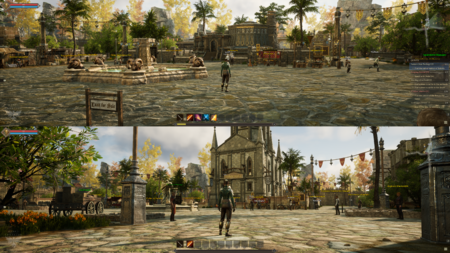
Das Layout und die Architektur innerhalb des Siedlungsgebiets einer Node werden durch die einflussreichste Volk bestimmt. Eine Node der Stufe 3, bei dem die Mehrheit der Spieler Py'rai sind, wäre zum Beispiel ein Py'rai-Dorf mit Py'rai-Architektur. Die meisten NSCs wären Py'rai-Elfen und würden Questlinien innerhalb der Py'rai-Erzählung anbieten.[17] – Margaret Krohn
Der Beitrag eines jeden Spieler wird mit dem entsprechenden Volk und anderen Faktoren makiert. Wenn eine Node aufsteigt, bestimmt das Volk dass am meisten beigetragen hat, den Stil und die Kultur der Node. Dieser Stil und Kulturwechsel kann bei jedem Stufenaufstieg statt finden. Wenn zum Beispiel eine Node auf Stufe 2 – Lager – aufsteigt und 51% der Beiträge von Ren’Kai kamen, wird die Node im Stil der Ren’Kai sein. Wenn die selbe Node zur Stufe 3 - Dorf – aufsteigt und Py’Rai 62% der gesammten Leistung beigetragen haben, dann ist die Node ein Py’Rai Dorf.[73] – Margaret Krohn
Das Layout und der Stil einer Node wird durch viele Faktoren bestimmt:[74][75]
- Das Node-System ist so konzipiert, dass diese in 18 verschiedenen Biomen existieren können, aber gleichzeitig die kulturellen Merkmale eines Volkes repräsentieren werden, die fester Bestandteil eines spezifischen Bioms sind.[76] – Steven Sharif
- Umgebung (Biome) und Standort der Node.[76][74][75]
- Die Node passt die lokale Topographie an die ästhetischen und strategischen Anforderung der Node an.[77]
- Derzeit ist das Plattformsystem so konzipiert, dass es die Topografie der Stellfläche der Node unabhängig vom umgebenden Terrain anpassen kann. Der Grund dafür ist, dass wir bei der Gestaltung des Node-Layouts flexibel sein wollen, und zwar sowohl aus ästhetischer Sicht als auch aus mechanischer Sicht mit den Node-Belagerungen - wie sie aufgebaut sind, und diese Bauweise sollte in der Lage sein, eine Vielzahl verschiedener Arten von Topografien zu berücksichtigen. Das heißt, es sollte nicht von der Umgebung abhängig sein. Das heißt aber nicht, dass die Umgebung nicht einen gewissen Einfluss haben wird. Wir experimentieren zum Beispiel ein wenig mit der Plattformtechnologie und stellen eine Node an die Seite eines Berges, am Rande einer Klippe oder an einem Standort, der eine schöne Aussicht bietet. Das sind natürlich Dinge, die wir ausprobieren werden, während wir weiter am Node-Tool arbeiten und daran, wie das Plattformsystem funktioniert, aber die Idee ist, dass die Nodes unabhängig vom umgebenden Terrain sind.[77] – Steven Sharif
- Einige Teile werden durch das Gebiet bestimmt, in dem sie sich befinden. Einige Teile werden durch den Typ bestimmt, der sie ist. Einige Teile werden durch die Völker bestimmt, und der Rest wird vom Bürgermeister bestimmt.[75] – Jeffrey Bard
- Das Volk, dass am meisten zum Fortschritt einer Node beigetragen hat, wird die Ästhetik der Gebäude, NPCs und Ausstattung bestimmen.[78][79][74][73][75][80][81]
- Das übergeordnete Volk werden nicht ihre kulturellen Einflüsse kombinieren. Zum Beispiel zählen die Py'Rai und Empyrean als verschiedene Kulturen. Das übergeordnete Volk, die Pyrian, existieren nicht mehr.[82]
- Der Stil und die Kultur einer Node kann sich bei jedem Aufstieg verändern.[73]
- Das trifft auf alle Nodes zu, Burg-Nodes eingeschlossen.[83]
- Alle Nodes, unabhängig davon, ob sie mit einer Burg oder mit einer normalen Node-Struktur verbunden sind, unterliegen kulturellen Einflüssen, die sich auf die gebauten Gebäude und die vorhandenen NPCs auswirken.[83] – Steven Sharif
- Der Rest wird vom Bürgermeister bestimmt.[75]
- Es wird möglich sein, dass eine Node mehrere Bauprojekte innerhalb der einmonatigen Amtzeit eines Bürgermeisters fertig stellt.[84]
- Q: Wie lange werden die Spieler im Durchschnitt brauchen, um einen Node komplett von der Wildnis bis zur Metropole zu bewohnen/auszubauen?
- A: Es ist eine Sache, eine Node auf ein bestimmtes Niveau zu bringen: es ist eine andere Sache, diese Node weiter zu entwickeln; und ich kann dir nicht wirklich eine Durchschnittsvorhersage geben, weil eine Menge Variablen im Spiel sind. Es geht darum, wie viele Bürger die Node angezogen hat; welche Art von Verkehr die Node anzieht, basierend auf Dingen wie seinen Steuersätzen oder der Spezialisierung, die sie gewählt hat, basierend auf den Gebäudetypen, die sie gebaut hat. All diese Dinge sind Variablen, die die "durchschnittliche Ausbaudauer" einer bestimmten Node beeinflussen können. Es ist also schwierig, einen Durchschnittswert anzugeben, wenn es so viele Variablen in diesem Bereich gibt. Aber die Idee ist, dass wenn es ein bestimmtes Projekt gibt, an dessen Entwicklung die Spieler interessiert sind, basierend auf der Node-Stufe, dass sie die Möglichkeit haben, mehrere dieser Projekte innerhalb einer einzigen Amtszeit eines Bürgermeisters abzuschließen; und eine Amtszeit eines Bürgermeisters ist ein Monat.[84] – Steven Sharif
Cultural influences
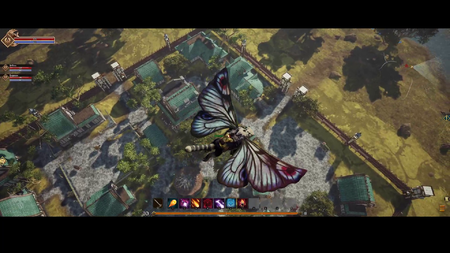
Wir haben im Wesentlichen Sets, die über alle Rassen hinweg existieren; und jede Rasse, die diese Rüstungssets trägt, wird ihren eigenen rassischen Einfluss auf die Präsentation dieser speziellen Sets haben. Das ist etwas Einzigartiges in der Art und Weise, wie jede der Rassen diversifiziert wird. Je mehr eine bestimmte Rasse zur Entwicklung einer Node beiträgt, desto mehr manifestiert sich dies in den architektonischen Einflüssen dieses bestimmten Nodes. Ihr werdet sehen, wie sich die Architekturen dieser Rassen auch innerhalb der Nodes manifestieren: Das ist eine weitere Art, wie wir jede Rasse diversifizieren und die Kultur jeder Rasse im Spiel durch diese Architekturen, durch diese existierenden Requisiten, durch die Schneiderei präsentieren der Rüstungssets, die der NPC tragen könnte, zu den verschiedenen existierenden Fraktionen. Fraktionen werden auch ihre eigene Zugehörigkeit zu verschiedenen Rassen haben. Jede Rasse wird auch eine andere Nomenklatur haben, wenn es um die Überlieferungen oder Orte in der Welt geht. Sie werden auch ihre eigenen sprachlichen Einflüsse haben: Die Art und Weise, wie sie sprechen, wird zwischen den Rassen unterschiedlich sein; wenn Sie Dialogbäume mit bestimmten NPCs haben. All diese Dinge tragen also wirklich dazu bei, eine immersive Welt zu schaffen, in der die Kulturen ihre eigene Identität haben[78] – Steven Sharif
Kulturelle Einflüsse manifestieren sich in vielerlei Hinsicht, von der Node und Ausrüstungsästhetik bis hin zu NPC languages und Überlieferungen. [78][86][73]
- Das Aussehen der Ausrüstung bestimmter Rüstungssets wird von der Rasse des Spielers beeinflusst. [78]
- Das Nodelayout und der Stil werden von der Rasse beeinflusst, die am meisten zu dieser Node beiträgt. [78]
- Vorteile können für Bürger der dominanten Kultur gelten, können aber auch für Mechaniken der Node gelten, was auch für Mitglieder andererRassen von Vorteil sein kann. [86]
- Es gibt Zermürbungsmechanismen, die Erfahrung und Einfluss beeinflussen, um eine einzelne Rasse davon abzuhalten, die ganze Welt zu dominieren. [87]
- NPCs reagieren unterschiedlich auf verschiedene Characterrassen. [88]
- Languages werden zwischen NPC Völker und in der Geschichte unterschiedlich sein. [78]
Es gibt eine Abnutzung und diese Abnutzung von Erfahrung und Einfluss wird basierend auf der Leistung des Rennens in der Welt erhöht. Wenn also all diese Nodes Ork-Nodes sind, dann ist ihre Abnutzungsrate sehr hoch, um mit der kulturellen Etablierung neuer Nodes zu konkurrieren, weil sie mehr Einfluss in der Welt haben und eine populäre Meinung gegen sie in ihren abgelegenen Regionen ist, in denen sie keinen Einfluss haben[87] – Steven Sharif
Constructible node buildings
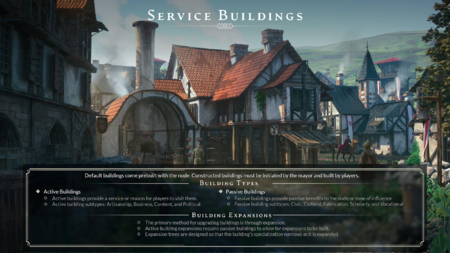
The important thing with the service building system for us is that it's a way to shape your node like a character; and to give you an exclusive niche that you can carve out in the world; or a niche that you fight over. If you go down this weaponsmithing path and you build your node to be this mecca of weaponsmithing and the node three doors down builds it, there's reason for you to conflict over it. They're taking your business. Or maybe you are in a zone and there isn't a weaponsmithing thing anywhere near you, and you do want to start to carve that path for yourself to make your node a place people visit and come to.[30] – Chris Justo
Service buildings within a node are either default buildings that come with the node, or they are constructed buildings, which are initiated by the mayor and built by players.[14][30][89][90][91][92][93] Service buildings are further broken down into two main types:[14][30]
- Active service buildings are service buildings that players directly interact with. These are further broken down into Artisanship, Business, Content, and Political categories.[14][30]
- Passive service buildings provide passive benefits to the node or its zone of influence. These buildings are broken down into Civic, Cultural, Fabrication, Scholarly, and Vocational.[14][30]
- Constructed service buildings are available to every type of node in every location. Where the uniqueness comes in is in some of the default buildings like your node-type building.[94] – Chris Justo
Service buildings are upgraded by expansions, which are unlocked through the placement of passive service buildings.[14][30]
- Building expansions unlock higher tier workstations at the cost of dedicating service building plots.[95][91]
- Node service building expansions specialize the building through a tech tree based on the stage of the node.[96][97]
Service buildings incur a regular maintenance cost of node commodities and gold from the node treasury in order to continue operations.[14][98]
Volk-spezifische NPC Interaktionen
NPCs werden unterschiedlich auf verschiedene Tags eines Charakters reagieren.[88]
Node-Belagerungen
Node-Belagerungen ermöglichen es Spielern, eine Node zu zerstören.[73] Dies ebnet den Weg für die Neuentwicklung und den Zugriff auf die gesperrten Inhalte in den umliegenden Nodes. Aufgrund dieser Dynamik spielen politische Konflikte und Intrigen eine wichtige Rolle in der Struktur der Welt.[100]
Angriffe auf Nodes werden für die Angreifer eine Herausforderung darstellen. Städte und Metropolen werden einen erheblichen Abwehrvorteil haben. [100]
Wenn du ein Haus in einem Nodepunkt besitzt und nicht möchtest, dass dieses Haus zerstört wird, müsst du diese Stadt verteidigen![101] – Steven Sharif
Der Großteil (~80%) der Inhalte in Ashes of Creation sind open-world, möglicherweise kann es jedoch instanziierte Kämpfe innerhalb von Burg- und Node-Belagerungen geben, bei denen bestimmte Gruppen an kleinen, kurzzeitigen zielbasierten Kämpfen um bestimmte Zwischenziele teilnehmen können.[102]
Bestrafungen für den Tod gelten nicht für zielbasierte Events (wie Karawanen, Gildenkriege, und Node-Belagerungen).[103]
Node wars
Node-Regierungen können einer anderen Node den Krieg erklären und Bürger für die Sache gewinnen. [28]
- Dadurch werden die Bürger der kriegführenden Node, einschließlich ihrer Verbündeten, gegenseitig als Kombattanten gekennzeichnet. [104]
- Die Aufträge sozialer Organisationen sind entweder kooperativ oder gegnerisch, basierend auf dem Kriegsstatus ihrer übergeordneten Node. [104]
- Vasallen-Nodes können ihrer übergeordneten Node oder ihren anderen Vasallen keinen Krieg erklären. [17]
- Node-Kriege können jederzeit ausgerufen werden, aber die Ziele erscheinen nur während der Server Prime-Time.[105]
- Spieler können sich während des Krieges jederzeit gegenseitig töten (nicht nur während der Server Prime-Time).[105]
- We have conditions that you can set between nodes with regards to either nodes being friendly with each other and acting trade alliances, or they can declare war on nodes similar to how guild wars may function in different games, where those citizens become hostile to each other based on the player government that's elected in the particular node. So those systems all cater to allowing a conflict that's meaningful and that also provides a non-imbalanced relationship between stronger guilds and not as strong guilds.[106] – Steven Sharif
Node politics
Innerhalb der Node wird es keine Bürgerkriegsmechanik geben, aber es wird Spielraum für interne politische Konflikte geben; wie die Untergrabung der derzeitigen Führung und die Störung des Handels.[107]
- Die einzige Möglichkeit, einen gewählten Bürgermeister vor Ablauf seiner Amtszeit zu entfernen, besteht darin, die Node zu zerstören. [108]
Wir möchten, dass die Konsequenzen eine Rolle spielen, und wenn diese Person gewählt wurde, müsst ihr mit den Mitteln der Mechanik arbeiten, um sie abzuwählen.[108] – Steven Sharif
Handelsabkommen
Regierungen von Nodes können Handelsabkommen mit anderen Nodes beschließen. Jede Node, die an einem solchen Handelsabkommen teilnimmt, kann Karawanen mit Materialien zu der anderen senden; wodurch die Wirtschaft beider Nodes verbessert wird. Dies gibt Erfahrung für alle Involvierten, trägt zum Wachstum der Node bei, und hilft bei dem Bau von Gebäuden.[28]
Söldnergilden werden für viele Organisationen einen praktischen Nutzen haben. Ich denke, dass man damit viele Geschäfte machen kann; und eines unserer Systeme in unseren Handselsabkommen, ist die Einrichtung eines Treuhandkontos für genau diese Art von Vereinbarungen (Handelsabkommen zwischen Nodes).[109] – Steven Sharif
Handelsrouten
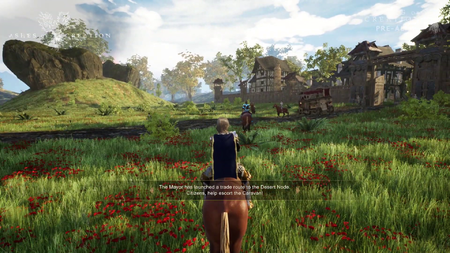
Zum Beispiel: Diese Node hier drüben könnte Zugriff auf Baumwolle als Ressource haben, und wenn diese Node diese Baumwolle verarbeitet, könnte es sich um eine sehr schöne Art von Leinen handeln, auf die nur diese Node oder sehr selten Nodes Zugriff haben würden. Wenn ihr also eine Handelsroute eröffnez, bringt eure Vorräte mit, die der Bürgermeister angefordert hat, weil er versucht, eine bestimmte Art von Dienstleistungsgebäude zu bauen, oder weil er versucht, einen Bauplan freizuschalten, auf den er jetzt Zugriff hat , um eure Node aufzubauen.[110] – Steven Sharif
Handelsrouten in Ashes of Creation beziehen sich auf:
- Roads für den Transport von Gütern über das Karawanensystem.[111]
- Ihr habt vielleicht einen Bergpass und im Winter ist dieser Bergpass immer geschlossen und so ändern sich die Handelsrouten auf dem Land mit Karawanen und das ist etwas, das nicht nur auf zyklischer Ebene existieren kann, sondern auch dynamisch basierend auf Spieleraktivitäten. [111]
- Wirtschaftliche Beziehungen zwischen Nodes, die von Bürgermeister oder Nodebürgern gegründet wurden.[110][35]
- Vereinbarungen werden getroffen, um über NPC-gesteuerte Karawanen Waren zu handeln, welche für bestimmte Nodes oder Nodetypen einzigartig sind.[110][35]
- Aus diplomatischer Sicht die Möglichkeit für den Bürgermeister oder die Bürger, NPC-Handelsrouten zwischen Nodes als Handelsabkommen oder als diplomatischen Prozess einzurichten.[110] – Steven Sharif
Taxation
Bürgermeister können Steuersätze für ihre Node festlegen.[44]
- Dazu gehört auch das Festlegen von Steuersätzen, die für Wirtshausspiele gelten.[45][46]
Bürgermeister/Node-Regierungen weisen Ressourcen, Steuern, und Aufträge zu , um bei der Entwicklung der Node zu helfen.[50]
- Steuergelder fließen nur in die Finanzierung der Nodeentwicklung. Dieses Gold kann nicht vom Bürgermeister oder einem anderen Spieler abgehoben werden. [114][47]
- Die Steuersätze skalieren basierend darauf, wann ein Spieler einer Node als Bürger beigetreten ist. Das Ziel ist es, finanziellen Druck auf die Node-Populationen auszuüben, indem die Steuern mit fortschreitenden Nodes, immer teurer werden, anstatt harte Bevölkerungsobergrenzen einzuführen. [115]
Übergeordnete (souveräne) Nodes erhalten einen Teil von allen Steuern aus Unterkünften und Dienstleistungen, welche von ihren Vasallen-Nodes gesammelt werden. [114][116]
- Diese Steuer wirkt sich nicht unbedingt auf den einzelnen Bürger, da die Steuersätze der Bürger von ihren Nodes bestimmt werden , aber die Finanzen der Node wird von der Besteuerung beeinflusst, die von seiner übergeordneten Node erhoben wird.[116]
When a node reaches stage 3 (Dorf) and a player run government has formed, all player housing will pay taxes.[117]
- A player's tax charge will be determined by the number of structures built on their plot.[118][47]
- Freehold taxes are calculated based on the number of permits issued for buildings on a freehold.[119][120][121][118][47]
- Buildings that require permits will have additional upkeep costs.[119]
- Maintaining businesses requires licensing and payments to the node your Freehold is associated with. This permitting system allows for a certain number of buildings to be constructed on a Freehold. Permits can be obtained from the same node the Freehold was certified from, and buildings that require permits will have an additional upkeep cost.[119]
- Housing foreclosures result from failing to pay property taxes or other fees.[119]
Bildmaterial
Siehe auch
Einzelnachweise
- ↑ Liveübertragung, 2020-03-28 (1:02:46).
- ↑ 2.0 2.1 2.2 2.3 2.4 2.5 2.6 2.7 2.8 MMOGames interview, January 2017
- ↑ 3.0 3.1 3.2 3.3 3.4 Liveübertragung, 2019-07-26 (1:20:48).
- ↑ 4.0 4.1 4.2 4.3 4.4 4.5 4.6 4.7 Liveübertragung, 2017-11-17 (9:49).
- ↑ 5.0 5.1 Liveübertragung, 2020-07-25 (1:52:45).
- ↑ Liveübertragung, 2020-03-28 (1:01:34).
- ↑ 7.0 7.1 7.2 7.3 7.4 Interview, 2020-03-27 (6:03).
- ↑
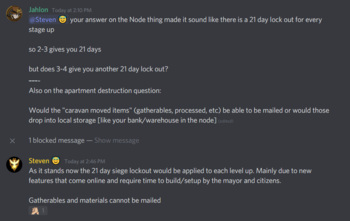
- ↑

- ↑

- ↑ 11.0 11.1 11.2 11.3 Liveübertragung, 2020-10-30 (1:01:00).
- ↑ 12.0 12.1 12.2 12.3 12.4 12.5

- ↑ 13.0 13.1 Interview, 2018-05-11 (50:05).
- ↑ 14.00 14.01 14.02 14.03 14.04 14.05 14.06 14.07 14.08 14.09 14.10 14.11 14.12 14.13 14.14 14.15 14.16 14.17 14.18 14.19 14.20 14.21 14.22 14.23 14.24 14.25 14.26 14.27 14.28 Blog: Development Update with Village Node.
- ↑ 15.0 15.1 15.2 Liveübertragung, 2023-08-31 (24:54).
- ↑ 16.0 16.1 16.2 16.3 16.4 Node series part II – the Metropolis.
- ↑ 17.0 17.1 17.2 17.3 17.4 Blog - Know Your Nodes - The Basics.
- ↑ 18.0 18.1 18.2 18.3 Interview, 2020-07-19 (26:54).
- ↑ Liveübertragung, 2021-03-26 (1:18:26).
- ↑ Liveübertragung, 2023-10-31 (1:35:22).
- ↑ Liveübertragung, 2021-11-19 (51:56).
- ↑

- ↑ Podcast, 2018-05-11 (52:20).
- ↑ 24.0 24.1 Interview, 2020-03-27 (09:05).
- ↑ Interview, 2020-03-27 (11:04).
- ↑ Liveübertragung, 2021-03-26 (1:17:20).
- ↑ Video, 2023-08-31 (49:05).
- ↑ 28.0 28.1 28.2 28.3 28.4 28.5 28.6 28.7 City hall.
Referenzfehler: Ungültiges
<ref>-Tag. Der Name „https://www.ashesofcreation.com/news/city-hall/“ wurde mehrere Male mit einem unterschiedlichen Inhalt definiert. - ↑ Video, 2023-08-31 (33:07).
- ↑ 30.0 30.1 30.2 30.3 30.4 30.5 30.6 30.7 Liveübertragung, 2023-08-31 (50:25).
- ↑
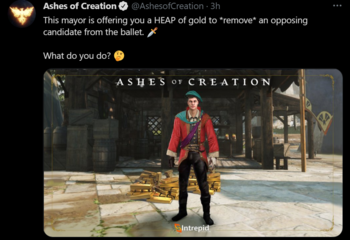
- ↑ 32.0 32.1 32.2 32.3 32.4 32.5 32.6 Liveübertragung, 2023-08-31 (31:44).
- ↑ Liveübertragung, 2023-08-31 (37:35).
- ↑ Liveübertragung, 2023-09-29 (1:05:44).
- ↑ 35.0 35.1 35.2 35.3 35.4 35.5 35.6 Video, 2019-07-15 (2:12).
- ↑ 36.0 36.1 Video, 2023-09-29 (2:59).
- ↑ 37.0 37.1 37.2 37.3 37.4 Liveübertragung, 2023-08-31 (2:10:23).
- ↑ Liveübertragung, 2018-12-12 (14:48).
- ↑ Liveübertragung, 2023-08-31 (59:43).
- ↑ 40.0 40.1 Interview, 2020-07-08 (1:04:05).
- ↑ 41.0 41.1 Liveübertragung, 2017-06-30 (53:57).
- ↑ Liveübertragung, 2023-08-31 (39:17).
- ↑ 43.0 43.1 43.2 43.3 43.4 43.5 Liveübertragung, 2022-04-29 (27:42).
- ↑ 44.0 44.1 44.2 Liveübertragung, 2020-03-28 (1:03:38).
- ↑ 45.0 45.1

- ↑ 46.0 46.1

- ↑ 47.0 47.1 47.2 47.3

- ↑ Liveübertragung, 2020-07-25 (1:22:40).
- ↑ Liveübertragung, 2018-01-18 (37:05).
- ↑ 50.0 50.1
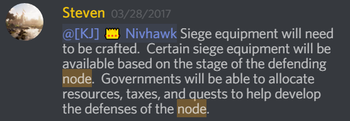
- ↑ Liveübertragung, 2020-06-26 (59:11).
- ↑ 52.0 52.1 52.2 Liveübertragung, 2023-08-31 (35:23).
- ↑ 53.00 53.01 53.02 53.03 53.04 53.05 53.06 53.07 53.08 53.09 53.10 53.11 53.12 53.13 53.14 Liveübertragung, 2023-08-31 (44:21).
- ↑ 54.00 54.01 54.02 54.03 54.04 54.05 54.06 54.07 54.08 54.09 54.10 54.11 54.12 54.13 54.14 54.15 Liveübertragung, 2022-08-26 (1:12:40).
- ↑ Liveübertragung, 2023-08-31 (29:04).
- ↑ Liveübertragung, 2023-08-31 (30:41).
- ↑
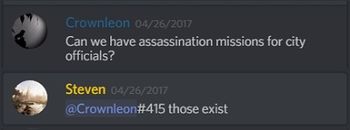
- ↑ Liveübertragung, 2021-12-23 (1:30:34).
- ↑ 59.0 59.1

- ↑ Liveübertragung, 2023-08-31 (41:15).
- ↑ 61.0 61.1 Liveübertragung, 2023-08-31 (28:30).
- ↑
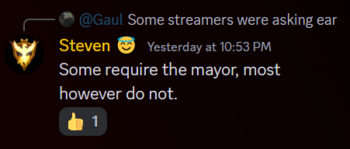
- ↑ 63.0 63.1 Video, 2023-09-29 (1:52).
- ↑ Liveübertragung, 2023-08-31 (29:33).
- ↑

- ↑ Liveübertragung, 2017-05-19 (36:05).
- ↑ Liveübertragung, 2017-05-19 (36:09).
- ↑
- ↑ 69.0 69.1 69.2 69.3 Liveübertragung, 2023-08-31 (47:43).
- ↑ Liveübertragung, 2023-08-31 (49:13).
- ↑ 71.0 71.1 Liveübertragung, 2023-04-07 (1:19:41).
- ↑ 72.0 72.1 Liveübertragung, 2022-08-26 (1:17:04).
- ↑ 73.0 73.1 73.2 73.3 73.4 Blog - Know Your Nodes - Advance and Destroy.
- ↑ 74.0 74.1 74.2 Liveübertragung, 2020-10-30 (39:17).
- ↑ 75.0 75.1 75.2 75.3 75.4 75.5 Liveübertragung, 2018-09-27 (53:06).
- ↑ 76.0 76.1 Liveübertragung, 2022-02-25 (41:00).
- ↑ 77.0 77.1 Liveübertragung, 2021-02-26 (1:12:18).
- ↑ 78.0 78.1 78.2 78.3 78.4 78.5 Liveübertragung, 2022-03-31 (4:57).
- ↑ Podcast, 2021-04-11 (29:47).
- ↑ Interview, 2018-05-11 (54:34).
- ↑ Liveübertragung, 2017-05-26 (21:23).
- ↑ Podcast, 2021-04-11 (23:36).
- ↑ 83.0 83.1 Interview, 2018-05-11 (47:27).
- ↑ 84.0 84.1 Liveübertragung, 2022-07-29 (1:13:09).
- ↑ Liveübertragung, 2020-06-26 (45:32).
- ↑ 86.0 86.1 Interview, 2021-02-07 (33:00).
- ↑ 87.0 87.1 Interview, 2018-05-11 (1:00:19).
- ↑ 88.0 88.1 Podcast, 2018-04-23 (29:56).
- ↑ Video, 2023-08-31 (2:59).
- ↑ Interview, 2023-07-09 (1:32:45).
- ↑ 91.0 91.1 Liveübertragung, 2017-05-19 (33:57).
- ↑ Liveübertragung, 2018-01-20 (38:17).
- ↑ Liveübertragung, 2018-04-8 (PM) (51:49).
- ↑ Liveübertragung, 2023-08-31 (56:18).
- ↑ Liveübertragung, 2023-08-31 (52:56).
- ↑ Video, 2023-08-31 (34:37).
- ↑ Liveübertragung, 2022-03-31 (1:13:00).
- ↑ Liveübertragung, 2023-08-31 (57:23).
- ↑ Video, 2016-12-04 (0:02).
- ↑ 100.0 100.1 A reactive world - Nodes.
- ↑ Video, 2017-04-30 (5:31).
- ↑ Liveübertragung, 2022-01-28 (17:50).
- ↑ Liveübertragung, 2020-12-22 (1:13:51).
- ↑ 104.0 104.1 Interview, 2020-07-19 (24:34).
- ↑ 105.0 105.1

- ↑ Video, 2018-04-05 (41:48).
- ↑ Liveübertragung, 2017-05-24 (40:50).
- ↑ 108.0 108.1 Liveübertragung, 2019-06-28 (1:26:14).
- ↑ Liveübertragung, 2018-04-8 (AM) (18:59).
- ↑ 110.0 110.1 110.2 110.3 Podcast, 2021-09-29 (8:38).
- ↑ 111.0 111.1 Video, 2022-05-27 (17:15).
- ↑ Liveübertragung, 2017-05-17 (30:53).
- ↑ Kickstarter - We Just Broke $1,500,000!
- ↑ 114.0 114.1 Liveübertragung, 2022-08-26 (1:10:16).
- ↑ Interview, 2020-03-27 (0:30).
- ↑ 116.0 116.1 Interview, 2018-05-11 (57:02).
- ↑

- ↑ 118.0 118.1 Liveübertragung, 2023-06-30 (1:45:22).
- ↑ 119.0 119.1 119.2 119.3 Blog: Exploring the Boundless Opportunities of Freeholds.
- ↑

- ↑ Interview, 2023-07-09 (54:46).
